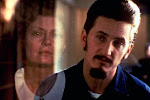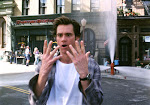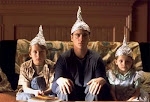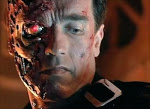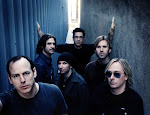 Starring Daniel Day-Lewis as Daniel Plainview and Paul Dano as Eli Sunday. Directed by Paul Thomas Anderson.
Starring Daniel Day-Lewis as Daniel Plainview and Paul Dano as Eli Sunday. Directed by Paul Thomas Anderson.
(Warning: Plot Spoilers)
Throughout There Will Be Blood, Eli Sunday and his Church of the Third Revelation exemplify the spiritual impotence of manmade religion. As an added feature to Eli's false religion, he also worships money, which is also spiritually impotent.
Soon after Daniel sets up to drill for the first time Eli requests an audience before the townspeople at the oil well's grand-opening, but Daniel very appropriately denies Eli's request. Eli says that he wants to "bless the drilling," but, in reality, he only wants to boost his congregation's PR by piggy-backing on Daniel's ingenuity and hard work.
Daniel continues to outmaneuver Eli for the rest of the movie, which is appropriate from the point of view of God's kingdom. Eli is a worldly man posing as a man of the church while Daniel is a worldly man who acts like what he is: a worldly man. Therefore, it is appropriate that Daniel should beat Eli at a game he only plays in secret.
Eli claims to worship God while, with his actions, he worships money. Daniel, to his credit, worships money with both his heart and actions.
Christ teaches his followers to conduct themselves with business savvy and yet avoid excessive preoccupation with the world: "No one can serve two masters, for either he will hate the one and love the other, or he will be devoted to the one and despise the other. You cannot serve God and money." (Matthew 6:24) and "seek first the kingdom of God and his righteousness, and all these things will be added to you." (Matthew 6:33)
Eli is entirely too distracted with the false power of money... but his religion never taught him any better. Not even the ostentatious cross he dangles from his neck can save him from having to beg Daniel for money.
Eli is an energetic man caught up in a lot of false spirituality. He is so distracted by tradition and religious showboating that he draws in a congregation of similarly distracted individuals. He even uses his position in the church as an excuse to take out his frustration on his father, Abel Sunday, whom he attacks both verbally and physically. It is ironic that Eli says, "God doesn't save stupid people" because, if this is true, then Eli is doomed in more ways than one.
 Eli feels a great deal of self-importance, which is natural for any young person who takes on a position of authority prematurely. Religion makes it possible for young people to go through the motions that make them look experienced. A young person need only learn how to say the right things at the right time to be accepted as expert amongst his religious colleagues. In this way it is also appropriate that Daniel outmaneuvers Eli: Daniel is more experienced than Eli. Daniel has been through more hardship and life-experience and is therefore better equipped endure life's difficulties.
Eli feels a great deal of self-importance, which is natural for any young person who takes on a position of authority prematurely. Religion makes it possible for young people to go through the motions that make them look experienced. A young person need only learn how to say the right things at the right time to be accepted as expert amongst his religious colleagues. In this way it is also appropriate that Daniel outmaneuvers Eli: Daniel is more experienced than Eli. Daniel has been through more hardship and life-experience and is therefore better equipped endure life's difficulties.
The final scene of the movie opens with Daniel passed out on his face in the middle of his private bowling alley. At this point we are led to believe that he has become a combination of psycho, burn-out and fall-down drunk. Then Eli strolls in, clean cut, talking about his successful "mission." Before the scene is over, however, Daniel tricks Eli into proclaiming that he is "a false prophet and God is a superstition." Within a few minutes Daniel casts doubt on everything Eli believes. Then Daniel kills Eli. It turns out that Eli was coming to Daniel to ask for (can you guess?) ... money.
Money is the ultimate power in There Will Be Blood. Everyone bows down to its authority, even the religiously outspoken Mr. Sunday. But money never has and never will do anything substantial for anyone. Ultimately it didn't even help Daniel even though he accumulated more than everyone around him. He still lost everything truly valuable in his life, from family and friends to any personal joy or contentment.
There Will Be Blood
The Game Plan
 Starring Dwayne Johnson as Joe Kingman, Roselyn Sanchez as Monique Vasquez and Madison Pettis as Peyton Kelly.
Starring Dwayne Johnson as Joe Kingman, Roselyn Sanchez as Monique Vasquez and Madison Pettis as Peyton Kelly.
Joe Kingman is on top of his game. He the quarterback and general inspiration for the Boston Rebels who, thanks largely to Joe, finally have a chance at the illusive national championship. His professional career has led up to this opportunity. Then he finds out that he has an 8-year-old daughter named Peyton.
Life gets a lot more hectic for Joe as he juggles full time football and full time fatherhood. He ends up losing a few toys but he finds out that he has gained immeasurably more by finding his daughter.
(Warning: Plot Spoiler)
The end of The Game Plan exemplifies Joe's life-reprioritization: He leads the Rebels to their big win (in the last 0.3 seconds of course) and everyone is happy... Joe is the hero! Now, to secure a $20mil bonus he just has to smile into the camera and say, "I'm going to [some fast food chain]." He couldn't possibly forget; his agent has been reminding over and over how and when to make this innocent little plug. Therefore there is no doubt that he deliberately does not make the plug; instead he says, "I'm going to hang out with my daughter," (or something like that), and walks past the cameramen. Well done indeed.
The Game Plan is refreshingly lighthearted, an all around solid family flick. Dwayne Johnson did a great job. I laughed out loud a few times (especially when he gets an allergic reaction to the cinnamon his daughter bakes into her special cookies).
Atonement

(Warning: Plot Spoilers!)
Cecilia and Robbie grow up together. Then they discovered that they are madly in love. They would have gotten married as soon as possible had not a young girl named Briony ruined both of their lives by wrongfully accusing Robbie of rape. By the time Briony gets the stones to own up to her mistake, Robbie and Cecilia have already died. In particular, Robbie dies in a war in which his wrongful accusations forced him to take part. Since they're already dead, Briony see no harm in putting off her confession until the last possible moment.
On a brighter note, Briony uses her self-loathing and regret to fuel a long and successful writing career. Atonement is her final novel. She is forced to record this off-handed confession because, alas, she is dying of old age and this is the last chance she's going to get. However she writes the story with one major change to the ending: "Cecilia and Robbie get the happy ending they deserved." This is her atonement for destroying their lives. The end.
Atonement reminded me that true atonement is extremely hard to come by. Briony dedicated much of her life to atoning for her sins but even that fell short.
Sin is more serious than we will ever comprehend. The fact that Jesus Christ, the Son of God, had to suffer and die to atone for our sins should scare us. We cannot imagine the lengths God went to by sacrificing His Son for us, especially since we would never have humbled ourselves to even ask for this forgiveness, especially since we will never fully appreciate this sacrifice (at least not in this life). But God did it anyway because He is God. He saved us despite ourselves.
Briony had a whole lifetime to think about atonement yet she never found it. She worked harder than most to obtain it but still never succeeded. In this way, true atonement requires less from us than we might imagine. From one point of view, atonement is simple, maybe even easy to obtain. All we have to do is ask God for it. From another point of view, atonement is unfathomably difficult to obtain, as Christ went to such lengths to obtain it for us.
Bad Religion -- "American Jesus"
I'm a member of a growing populace
We enforce our popularity
There are things that seem to pull us under
There are things that drag us down
But there's a power, a vital presence
Thats lurking all around...
We've got the American Jesus
See him on the interstate
We've got the American Jesus
He helped build the presidents estate
I feel sorry for the earth's population
Because so few Live in the U.S.A.
At least the foreigners can copy our morality...
They can visit but they cannot stay
Only precious few can garner the prosperity
It makes us walk with renewed confidence
Weve got a place to go when we die
And the architect resides right here"
Bad Religion is correct: We Americans have our own version of Jesus. We have our own own spin on God's gospel.
God's gospel is preoccupied with unfading, heavenly riches while the American gospel is tied up with worldliness. According to the our gospel, wealth and security are of the utmost importance, worth obtaining at all costs. According to God's gospel, the ultimate riches we could ever obtain is simply to know Jesus Christ, no matter what our situation.
Americans have succeeded in spreading a gospel of worldly prosperity rather than God's gospel. Sadly this has also been the case for many American missionaries who intended on preaching God's gospel.
It's not that financial prosperity is sinful in itself... it is possible (albeit extremely difficult) to be rich and godly at the same time. But what is our motivation? What effect have our actions had on the world?
We Americans have inspired the rest of the world to work for a level of worldly prosperity that resembles our own. We have transformed nations not with our political or religious savvy but with our love for material gain.
While Jesus Christ spreads his message by winning people's hearts, we spread the American gospel through economic and military invasion. In other words, the message we have successfully preached to the world is not God's gospel.
If we want to infect the world with Christ's message, then we must be infected with this message ourselves. We should have learned by now from experience that we can convey spiritual truth only so far as our lives are transformed by God's Spirit.
Overwhelming millions every day...
he's the preacher on TV
he's the motive and the conscience of the murderer
he's the form letter that's written by the big computers...
I'm fearful that he's inside me."
It's easy to differentiate between the jesus Bad Religion speaks of and the real Jesus. Jesus Christ came "to serve, not to be served." He came to teach us a new kind of authority, which works from the heart outward. He came to establish a heavenly quality of government that will never fade because its foundations are in heaven.
1 comments
![]()
![]() Tags:
Bad Religion
Tags:
Bad Religion
Mary Poppins
 1964, starring Julie Andrews as Mary Poppins, Dick Van Dyke as Bert and David Tomlinson as Mr. Banks.
1964, starring Julie Andrews as Mary Poppins, Dick Van Dyke as Bert and David Tomlinson as Mr. Banks.
Mary Poppins is a meticulously crafted children's film: Solid storyline, solid acting, unique vision, artistically top-notch.
Mary Poppins cares for Jane and Michael with a perfect balance of disciplinarian and motherly love. She doesn't let them drag their feet, but she isn't condescending either. Contrasting to Mr. Banks, who tears up his children's attempt at helping him find a nanny, Mary Poppins tapes this small gesture back together and uses it as her guideline for acquiring the nannying position. Mary Poppins shows the children a good time and even teaches them a few things along the way, but her main accomplishment is that she restored balance to the Banks household. Mr. Banks is so distracted with his lofty views of "the man" as king of his own household (like the king of Britain) that he forgets to take charge as the father of his household. He tries to carry over his mentality of the banking business over into the way he runs his own family: he bursts into song at one point, singing "A British bank is run with precision, a British home requires nothing less." In all his British manliness, he maintains a detached relationship with his children and therefore fails to take any meaningful part in their upbringing.
Mary Poppins shows the children a good time and even teaches them a few things along the way, but her main accomplishment is that she restored balance to the Banks household. Mr. Banks is so distracted with his lofty views of "the man" as king of his own household (like the king of Britain) that he forgets to take charge as the father of his household. He tries to carry over his mentality of the banking business over into the way he runs his own family: he bursts into song at one point, singing "A British bank is run with precision, a British home requires nothing less." In all his British manliness, he maintains a detached relationship with his children and therefore fails to take any meaningful part in their upbringing.
Mr. Banks makes a brief attempt at blaming Mary Poppins for his problems, for bringing so much chaos into his well-ordered life. But Bert points out that Poppins can hardly be faulted for singing about "spoonfuls of sugar turning bread and water into tea and cakes." Bert gently reminds Mr. Banks that his children love him and will be grown up and gone before he knows it.
Mary Poppins injects the Banks household with a better outlook on life. It is this new outlook that shakes up Mr. Banks' safe little world. She precipitates events that stun him into reevaluating his roles both as a father as well as a banker. The brilliance of Mary Poppins's plan is that she fills in where Mr. Banks falls short as a father just long enough before she quietly exits the children's lives and allows Mr. Banks to fill in where she left off.
The pivotal point in Mary Poppins is Mr. Banks' breakdown in front of his stoic colleagues at the bank. To get to the bank he endures the longest walk of his lifetime, pondering his failures both as a father and a banker. He enters the ominous meeting room where one of his colleagues confirms his failure by requesting his resignation. At that point one of the men asks him, "Well, do you have anything to say?" To this Mr. Banks starts laughing, hardly understanding what has overcome him. He says, "Well there's only one thing left to say, and that's supercalifragilisticexpialidocious..." He goes on to explain what a wonderful woman Mary Poppins is and even tells them a joke before he dashes out of the room skipping and singing.
Everyone has this in common with Mr. Banks: We need our worlds turned upside down before we will question the direction of our lives. When our priorities are aligned correctly, when we seek "first things first," then all the smaller things will fall into place. Mr. Banks thought that he had lost his job by giving up his old, sterile lifelessness, but he ended up gaining everything in fuller measure than he ever imagined. Within a day his positions as father and banker had been restored more fully than he could have ever imagined.
In Jesus' words, "Seek first His kingdom and His righteousness, and all these things will be added to you" (Matthew 6:33)
Mary Poppins demonstrates the fact that Disney's movie-makers tend to accomplish what they set out to do... they either make sell-out sequels designed to rake in a few more millions or they create works of art that will not only make money but also stand the test of time. Mary Poppins falls within the latter category.
Fast Food Nation
 Based on the book by Eric Schlosser, directed by Richard Linklater; starring Greg Kinnear as Don Anderson (VC of marketing for fast-food giant Mickey's), Wilmer Valderrama as Raul (immigrant who works in meat packing plant), Bruce Willis as Harry Rydell and Kris Kristofferson as Rudy Martin (the old ranch owner). Ethan Hawke and Avril Lavigne also make appearances.
Based on the book by Eric Schlosser, directed by Richard Linklater; starring Greg Kinnear as Don Anderson (VC of marketing for fast-food giant Mickey's), Wilmer Valderrama as Raul (immigrant who works in meat packing plant), Bruce Willis as Harry Rydell and Kris Kristofferson as Rudy Martin (the old ranch owner). Ethan Hawke and Avril Lavigne also make appearances.
Don Anderson is the well-meaning VP of Mickey's, one of the nation's largest fast food chains. His claim to fame: He invented Mickey's best selling hamburger, "The Big One." Don takes the job of investigating recent claims by independent meat testers who say that Mickey's Big One contains significantly more feces than the average fast food burger. He travels to the Mickey's main supplier, a meat-packing plant in Texas, where he discovers a lot of disturbing truth about the fast-food industry as well as the American way of life in general. I hear this movie was inspired partly by Morgan Spurlock's Super-size Me.
Rudy Martin (Kristofferson) gives a powerful soliloquy about "The Machine" that is overtaking America. The meat-packing plant employed by Mickey's represents this Machine. The machine destroys human life either by economic exploitation or by literally hacking off people's limbs in its meat grinders. The machine gobbles up independent ranchers who want to maintain fair business practices. It doesn't care about animal or human suffering or whether it feeds cow manure to the fast-food eating populace every day. All this for "pennies a' pound."
Later on Don meets up with Harry (Bruce Willis) who delivers a similar soliloquy, only this time in favor of the Machine. On one hand, Don has a problem with there being "sh-- in the meat." Harry, on the other hand, has a problem with Americans getting to paranoid about germs. "Just cook the meat," Harry says. He goes on to say the real problem with America is that "everyone needs to grow up and see the big picture." He points out that the machine is a blessing to immigrants who go from working for four dollars a day in Mexico to making ten dollars an hour in a meat-packing plant.
It is true that the Machine provides jobs for people. But, true to the machine's form, these jobs are mechanical at best, dehumanizing at worst. Take people's orders. Push a button. Flip burgers. Process cow carcasses as blood and refuse squirts all over you.
The Machine tends to take more than it gives. A few benefit from the Machine, but most do not. The few who benefit keep speeding up the line despite the consequences this has on people and the environment. They will consume as much human life and natural resources as they can get away with. The only thing that matters to the few who control this Machine is more "pennies a' pound."
At one point in Fast Food Nation a car-full of young people try to free the cattle by cutting a hole in the meat factory's fence. They do their best to herd the cattle toward the hold, but the cows run away from the hole. They have to leave soon after that, as some of the factory's workers are coming, but one of the girls stays behind for a moment to ask the cattle, "Don't you want to be free?"
We humans bear a resemblance to these cows. We like our fence. Although we hear the bone-grinding machinery in the distance, we can't resist the temptation of feeling secure. False security is acceptable to us so long as we feel secure. We want to preserve our political freedom, but only in controlled doses. We defend our right "to be left alone" up until someone hangs by one leg, upside down, and puts a knife to our neck... then we might acknowledge that something is wrong with the world around us. Average people wait until they're teetering over the bone grinders of life before they start to think "why am I doing this?" ... but by this time it is too late for change.
The aforementioned young people were right in taking action. They were on the right track when they tried to face their problem head on. Their failure would not have been all loss had they stopped to consider what is true change.
Answer: True change is an aftereffect of transformed hearts. Teach people how and why they should care and there will be change indeed.
Neo's Faith in Action
 They're about to pull the plug on Morpheus, but Neo stops them. He is deciding what he really believes.
They're about to pull the plug on Morpheus, but Neo stops them. He is deciding what he really believes.
The Oracle told Neo what he needed to hear. Things aren't going to work out the way he expected, but he's making a decision regardless.
The Abyss vs. Contact
Contact (starring Jodi Foster and Matthew McConaughey) bears a striking resemblance to The Abyss (starring Ed Harris) in structure, plot and overall message.

In both movies people interact with aliens in foreign environments (space in Contact, under water in The Abyss).
Both movies take advantage of the belligerent, overbearing military guy cliché. You know, the frowning officer who won't go away until screws up the whole project and/or nukes everybody.
Things move along predictably in both movies until the last fifteen minutes when the main character meets the aliens face to face. At this point the aliens inform the main character that "humanity has a lot to learn," which the aliens realize because their so much more advanced than humanity. This is also a cliché amongst sci-fi movies.
Both movies also deify aliens. This is based on the following scientific system of thought: "We don't really want to mention God, but there still seems to be a lot of miraculous stuff going on, so let's just say, that, um, aliens are doing everything! Yes, that's it! Let's also say that these "aliens" are really advanced, and they believe in peace and harmony... oooh, yeah, that's deep."
Contact
 Based on the book by Carl Sagan (famous atheist astronomer). Starring Jodi Foster as Dr. Eleanor (Ellie) Arroway and Matthew McConaughey as Palmer Joss.
Based on the book by Carl Sagan (famous atheist astronomer). Starring Jodi Foster as Dr. Eleanor (Ellie) Arroway and Matthew McConaughey as Palmer Joss.
Contact reminded me a lot of Abyss in it's attempt to extract morality from science. Both movies give the lesson: "It's gonna take aliens to show you silly humans how to co-exist." Also, both movies are relatively mundane until the last 15 minutes, when one daring person encounters the dazzling aliens.
Ellie learns from her hardships not to trust anything but science. Then she runs into a missionary/priest named Palmer Joss. She's hot for him and he's hot for her, so they decide to do each other. Eventually, though, her scientific convictions win her over and she leaves him in favor of listening for signals from space aliens.
After four years of listening to static Ellie's diligence pays finally off: She hears and records the first ever message from space aliens. Much to everyone's surprise, the message is a recording of the first television broadcast, which happens to be Hitler delivering an energetic speech to his fellow Nazis (you know, that same clip we always see on the History channel). This is less than ideal because people start thinking that maybe the aliens are Nazis. A few other things go wrong, but Ellie eventually gets to travel through a worm hole using a large "wormhole digging tool," (as translated directly from the alien blueprints). The wormhole digger works. She contacts the aliens and lives to tell about it. Unfortunately, no one back on earth believes her. I think that Carl Sagan sees himself as a real-life Dr. Eleanor Arroway. He sees himself as one independent thinker amongst a sea of religious/militaristic/governmental zombies. He is Jodi Foster, sitting there in front of a board of interviewers, battling that scourge called "religion" that oppresses ninety-something percent of the world. Much like Jodi Foster, Sagan is determined to prove that wormholes and aliens exist, which will, in turn, prove that God does not exist. Step aside you bomb-strapped Jesus freaks! Step aside you closed minded military guys who wants to nuke the world... make way for progress! Make way for Science!
I think that Carl Sagan sees himself as a real-life Dr. Eleanor Arroway. He sees himself as one independent thinker amongst a sea of religious/militaristic/governmental zombies. He is Jodi Foster, sitting there in front of a board of interviewers, battling that scourge called "religion" that oppresses ninety-something percent of the world. Much like Jodi Foster, Sagan is determined to prove that wormholes and aliens exist, which will, in turn, prove that God does not exist. Step aside you bomb-strapped Jesus freaks! Step aside you closed minded military guys who wants to nuke the world... make way for progress! Make way for Science!

Seriously, though, Sagan must have had a few disenchanting experiences with religion, probably some sect of Christianity. The same is probably true of Jodi Foster as well, or else she would not have taken that role.
In light of this, Carl Sagan and anyone who hides behind religion to excuse their disbelief should know: God has between little and nothing to do with religion. For your own sakes, get over it.
Sagan does make a good point, albeit indirectly, about the majority of the world being religious. Carl Sagan, for example, is religious.
Being a fanatic can be a good thing... it just depends on what you're fanatical for. Carl Sagan, for example, is fanatical for atheistic science. The fruit of his dedication is: He can point out what he does not want to be (a religious fanatic), but he can't point out what he actually wants to be.
Note: The religious nut with the blond hair (pictured above) is not a Christ-follower. A true follower of Christ wouldn't be so insecure about scientific exploration because God is not insecure about scientific exploration. Why would God be insecure about exploring His own creation?
Of all the causes in the world, the one most worthy of fanaticism is Jesus Christ. Christ-followers (if they are for real) are fanatical about everything that is good, pure, admirable and praise-worthy. In short, they obey God.
The more Christ-followers there are in the world, the better off the world will be. For example, people who imitate Christ will sacrifice themselves for the good of others. They will do what's right even when no one is looking. They will excel at whatever they do. Such people will stick to their word, they will be unconditionally loving and they will rejoice to learn any truth, no matter where it comes from.
Forrest Gump -- Destiny
 Toward the end of the movie Forrest Gump speaks to Jenny's grave:
Toward the end of the movie Forrest Gump speaks to Jenny's grave:
"Jenny, I don't know if mama was right, or if it's Lieutenant Dan, I don't know if we each have a destiny or if we're all just floatin' around accidental like on a breeze... but i think, maybe it's both. Maybe both are happening at the same time..."
Forrest had seen and experienced a lot. He also took things for what they were, unassumingly. He had endured a lot of hardship, maybe more than what he deserved, but he dealt with it to the best of his ability. Overall, a man such as this would be more qualified than most to speak about "the way things are."
According to Forrest Gump, we are not inextricably bound to fate nor are we "floatin' around accidental like on a breeze." Both of these realities apply at the same time.
This is the best explanation for life and living because we should not claim to have things figured out completely. God intercedes, but we also have a choice in the matter. God gave us a choice in the matter.
It is impossible to size up God; this is both good and necessary. For this reason innocent minds tend to know Him best. Those who take Him at His word, who know Him through faith, will know Him best.
The mysteriousness of life hints at the depth of God's character.
1 comments
![]()
![]() Tags:
Forrest Gump,
Tom Hanks
Tags:
Forrest Gump,
Tom Hanks
Why did Kerry Livgren and Scott Stapp Leave Their Bands?

... henceforth Kansas lost its formerly immense popularity and Creed broke up.
From a worldly, or measurable point of view, Livgren and Stapp's decisions were unwise. By leaving their bands they lost the huge fan base that would have listened with rapt attention to anything they had to say. They could have kept writing their Spirit-laden lyrics, which might have topped out the mainstream music charts time and again.
On the other hand God doesn't care about being mainstream. He designed His gospel to be anything but mainstream. Jesus hints at this when He says "Enter through the narrow gate. For wide is the gate and broad is the road that leads to destruction, and many enter through it. But small is the gate and narrow the road that leads to life, and only a few find it." (Matthew 7:13,14).
It may be that leaving behind their old acts was inevitable. Both Kansas and Creed stuck together for at least ten years, during which they came out with some of the best selling albums the music industry has ever seen. I would imagine that, after so many years, Livgren and Stapp must have felt stifled. They probably wanted to express their faith straightforwardly instead of in the veiled manned that their positions in the mainstream music scene necessitated.
0
comments
![]()
![]() Tags:
Creed,
Kansas,
Kerry Livgren,
Scott Stapp
Tags:
Creed,
Kansas,
Kerry Livgren,
Scott Stapp
LifeHouse, Kerry Livgren, Scott Stapp and the "Christian" Stigma
 It would seem that Lifehouse doesn't get as much mainstream air time as they used to. This might be for a couple of reasons: Either their style has deteriorated (which i doubt) or mainstream radio doesn't like playing bands that have been labeled (or branded) "Christian."
It would seem that Lifehouse doesn't get as much mainstream air time as they used to. This might be for a couple of reasons: Either their style has deteriorated (which i doubt) or mainstream radio doesn't like playing bands that have been labeled (or branded) "Christian."
Every so often mainstream artists become Christian and then drop off the radar of mainstream entertainment. I might be imagining this. Then again, if this really does happen (to bands such as Lifehouse) I can think of two plausible reasons why: (1) people distrust religion and therefore avoid it or (2) people hate God and therefore avoid Him.
Of course there is no set equation for the "Christian" stigma. Scott Stapp went solo before he made his leap into the Christian music scene. Consequently his debut solo album, "The Great Divide," wasn't nearly as popular as his work within Creed.
Consequently his debut solo album, "The Great Divide," wasn't nearly as popular as his work within Creed.
Another similar case is Kerry Livgren, whose popularity plummeted as soon as he left his post as lead singer and songwriter for Kansas to go solo and "Christian."
We might say that everyone who leaves their band behind to go solo crashes and burns on the pop charts... but this has not been the case for artists such as Beyonce Knowles (former lead singer of Destiny's Child) or Justin Timberlake (former lead singer of Nsync). It is more likely that anyone who goes solo and "Christian" at the same time will crash and burn on the pop charts.
Another possibility is that Christian bands tend to produce lower quality music than worldly bands because they are not as true to themselves as worldly bands. It is harder for a Christian band to be wholeheartedly godly than it is for a godless band to be wholeheartedly godless. Maybe Christian bands tend to be less artistically savvy than non-Christian bands because they struggle with a conflict of interests within themselves... an identity crisis if you will. It would difficult for a Christian band to be 100% God-inspired because there are other forces such as secular culture and man-made religion vying for their attention.
5
comments
![]()
![]() Tags:
Creed,
Kansas,
Kerry Livgren,
LifeHouse,
Scott Stapp
Tags:
Creed,
Kansas,
Kerry Livgren,
LifeHouse,
Scott Stapp
LifeHouse -- Sick Cycle Carousel
 "Sick Cycle Carousel," by LifeHouse, gives a candid look into any believer's struggle with sin.
"Sick Cycle Carousel," by LifeHouse, gives a candid look into any believer's struggle with sin.
I tried to chase you down
I tried to see how low I can get down to the ground
I tried to earn my way
I tried to tame this mind
You better believe that I tried to beat this
So when will this end
It goes on and on
Over and over and over again
Keep spinning around I know that it won't stop
'Til I step down from this for good
I know that God is good. I have experienced God's goodness. Yet there is nothing in me that is naturally good. I know intellectually that purity is worth pursuing yet a major part of me still desires everything that is impure.
God has saved me yet there is still much work to be done in my heart and mind. This is purposeful.
I might try with my own energy to live sinlessly for one day, but this is impossible. That I would set such a goal for myself proves that I am distracted. We might imagine that God's goal for us is that we avoid sin. But God requires much more than that.
As implied at the end of Sick Cycle's chorus, we will gain freedom from sin when we die. This is true both right now as well as later on when we die from old age.
God requires His people to die in Christ right now. Death from old age is only one more step in our eternal calling.
Gaining freedom from sin is part of the lifelong process of following after Christ. Either through hardship or through rest (usually hardship) our Rabbi teaches us to desire good.
The more we eat and drink Christ the less we will desire imitation fillers. In the same way that it makes sense to eat bread more often than cotton candy, so also it makes sense to eat and drink Christ rather than whatever the world has to offer.
There is an immediate advantage to acknowledging our addiction to sin. A true realization of our inbred wickedness will drive us to depend completely on God's Spirit (rather than our own intellectuality or physical strength).
0
comments
![]()
![]() Tags:
LifeHouse
Tags:
LifeHouse
Liar, Liar (starring Jim Carrey)
 Starring Jim Carrey as Fletcher Reede, Maura Tierney as Audrey Reede and Jennifer Tilly as Samantha Cole.
Starring Jim Carrey as Fletcher Reede, Maura Tierney as Audrey Reede and Jennifer Tilly as Samantha Cole.
Fletcher is a full time liar... I mean, lawyer. A typical day in Fletcher's life involves manipulating his clients, his competition, the justice system, his coworkers and even his own family. However on one fateful day, his son makes a wish, blows out his birthday candles and suddenly Fletcher can't lie anymore. He cursed with the inability to lie for one whole day.
For the most part Fletcher believes this new "handicap" is the worst thing that's ever happened to him. Then he realizes that, by embracing such a duplicitous lifestyle, he has given up everything that is truly valuable. Lying had became a lifestyle for him, thereby causing him to neglect his relational and spiritual health.
It took something as drastic as a magical force to knock some sense into Fletcher. Thanks to this miraculous day, he starts appreciating the value of sincerity and relational openness. He learns that it would be better to lose all the selfish, shallow things he had been clinging to in favor of being open and honest with himself and his loved ones.
0
comments
![]()
![]() Tags:
Jim Carrey,
Liar Liar
Tags:
Jim Carrey,
Liar Liar
No Country for Old Men
 Starring Tommy Lee Jones as Ed Tom Bell (the old sheriff longing for the good old days when crime made sense), Josh Brolin as Llewelyn Moss (the cowboy who finds the money) and Javier Bardem as Anton Chigurh (the stoic bad guy).
Starring Tommy Lee Jones as Ed Tom Bell (the old sheriff longing for the good old days when crime made sense), Josh Brolin as Llewelyn Moss (the cowboy who finds the money) and Javier Bardem as Anton Chigurh (the stoic bad guy).
The psychotic killer plot has been done so many times that, had I known this movie's general plot beforehand, i wouldn't have been so eager to see it. Even so, No Country for Old Men is the most original psycho-killer movie I have ever seen. The Coen brothers constructed their film around an unassumingly unpredictable plot. If the task of making this movie had been given to a lesser director (such as Quentin Tarantino), he would have blasted out something over-the-top rather than original.
Did you notice how much No Country looked and felt like The Way of the Gun (starring Ryan Phillipe and Benicio Del Toro)? Same heap of money driving people crazy. Same disregard for human life from similarly stoic gunmen.
The theme of No Country is "nothing is as it should be." The people you think should live end up dying. The good guys can't even come close to catching the bad guy. Old men lament about the deplorable state of crime compared to the "good old days" when murder made sense.
The bad guy, Chigurh (pronounced "Shu-GAR") has a clear conscience about his serial killing; that's why he's so good at it. He channels his audacity into a clear-headed shrewdness that makes him impossible to catch. Chigurh is also more dedicated to his murderous trade than anyone else is dedicated to their trade, therefore he wins.
Power is also a theme throughout No Country for Old Men.
Chigurh observes that his victims like saying "You don't have to do it" just before he does "it" (shoots them). Its true, he has a choice, but he is so callused by his murdering lifestyle that he can no longer acknowledge such a simple truth. Murder has so thoroughly twisted his mind that he believes killing is his calling. This is why he is the "right tool" for certain jobs."
Chigurh kills almost everyone he meets, however sometimes he gives people the chance to live by tossing a coin... if they call it correctly then he lets them live. This is a failure to take responsibility for himself or it is a misguided power-trip.
The man in the convenience store called the toss correctly; we might credit his continued living to chance. However even the coin toss was Chigurh's choice. There's always a choice. God gives all people the power to choose. A man such as Chigurh is no more powerful than his victims (though he would like to think differently). All people have a purposefully limited sphere of influence which they can exercise during their limited lifespans.
The "old men" from this movie feel helpless and rightly so. The world around them is spinning out of control and there's nothing than can do about it.
Will we never improve? Will we spin out of control more and more until humanity detonates itself? Is there any point of reference for sanity or Power that might turn us around?
The world will continue to deteriorate. Everything will eventually be destroyed. But there will always be One who is eternally dependable, merciful and (thankfully) set apart from this fleeting existence.
So there is a country for old men; it's just not a physical country.
I will now tell you how to save your respective country as well as the whole world: Fall down before God and beg Him for mercy for yourself as well as the whole world.
When we comprehend our humble state before God for the first time we feel powerless, which is a good place to start. God uses the knowledge of death to shock some sense into our hearts and minds and introduce us to His Son. This is God's redemptive genius. The knowledge of death makes life seem pointless, but God uses the knowledge of death as a tool for saving people.
God has to reason with us on a primitive level to bring us around to accepting His grace. Then, once we see the Light, as it were, He teaches us a new, unexpected quality of power.
Conversations with God
 Starring Henry Czerny as Neale Donald Walsch; directed by Stephen Deutsch.
Starring Henry Czerny as Neale Donald Walsch; directed by Stephen Deutsch.
There are a lot of good things about Neale's revelations. He discovers the freedom of confessing his imperfections so he can move forward from wherever he is. This is practical for daily living, it's also reminiscent of true redemption. Neale also discovers that the most beneficial thing for himself is to seek that which benefits others (at least this is what he says, I didn't notice him risking much for other people).
There are also a lot of dangerous half-truths in this movie. Half-truths are oftentimes more dangerous than blatant lies because they mislead even well-meaning people.
For example, the Voice just wants Neale to be happy. This is a half-truth because God wants people to be happy, but this is not His top priority. Happiness, joy and contentment are after-effects of aligning oneself with God's priorities, or obeying God. Obeying God is difficult, painful and at times even humiliating. Jesus, of all people, deserved worldly prosperity or at least some comfort. But what did Jesus get in return for His perfect life? He was beaten, mocked and then hung on a cross until he either suffocated or bled to death. The point is: success from God's point of view is not as predictable or as calculable as the movie Conversations with God would have you believe.
Another half truth is that monetary well-being equals being right with God. This is a man-made, health-and-wealth gospel, a far cry from the real gospel, which requires dying to oneself daily. I fear for the people who will hear Neale's message and think that their material lack is one more confirmation that God hates them. This underlying message made me feel self-conscious by the end of the movie.
Please, do not be deceived. God loves poor people. In fact, Jesus says poor people enjoy a spiritual advantage over wealthy people because they have less to distract them from having a pure faith in God.
Another partial-truth: "It doesn't matter what others think of you, it only matters what you think of yourself." What this is really getting at: "It's all about you." This lie dominates Conversations with God more than any other lie.
A conspicuous lie from Neale's Voice is: "The universe is conspiring in our favor." Although the earth contains the material we need to survive, the world is overwhelmingly prone to snatch away life. Death is one of the unavoidable end of life on earth. Ten out of ten people die... it's a dependable statistic. But God's mercy offsets the death and destruction that saturates this existence. Every breath demonstrates God's astounding mercy. "The universe is conspiring in our favor" is the kind of philosophy that a spoiled, luxury-saturated society would invent. For this reason, feel-good religion prospers during times of material prosperity. But the faith in the Real God endures through any circumstance.
The Voice that Neale equates with God confuses me in much the same way the Force from Star Wars confuses me. The Voice is divine and yet part of Neale, who is not divine. So also, the Force is part of everything and everyone, and yet It doesn't seem to have it's own consciousness. Is Neale talking to Something divine, or is he talking to himself, or is he talking to creation in general? Is Neale answering himself, or is Something else answering? When characters in Star Wars say, "May the Force be with you," are they commanding the Force to be with someone? Can a Jedi, for example, address the Force directly? "May the Force be with you," sounds similar to "God bless you," except the latter implies direct contact with God. If I say "God bless you," that means "I am asking God right now to bless you."
There is one main thing, or I should say, Main Person: Jesus Christ. He is the Great Dividing Factor. People always will and always have invented different gods for themselves, but Jesus Christ came to eliminate all doubt that God is everything He says He is: holy, righteous and worthy of all worship and admiration forever.
Bad Religion -- "New Dark Ages"
 "New Dark Ages" comes from Bad Religion's latest album: "New Maps of Hell." It has a very "end times" feel.
"New Dark Ages" comes from Bad Religion's latest album: "New Maps of Hell." It has a very "end times" feel.The lyrics represent a mixture of biblical themes:
let's heed Ezekiel's call,
And bide until the word is good and ripe
and get plucked clean out of sight
The world will be erased
our kin will be Immaculate ejaculate in space
Before the kind of king's love,
he'll snatch us From above,
brothers help me sing it"
I looked up something about being "plucked out of sight" or "waiting until the word is ripe" in Ezekiel and could not find anything (please let me know if you know specifically what part of Ezekiel Greg Gaffin was referring to). This is a general theme throughout the Bible in any case, especially in the New Testament. Ezekiel certainly called God's people to obey God right now until God brings balances everything out again. Ezekiel speaks with an obvious sense of urgency about now being the time to heed God's Spirit and align ourselves with His priorities.
That can expand beyond all hope of light and plunge us into unrelenting night
A pall on truth and reason,
It feels like hunting season
So avoid those lines of sight and we'll set this right
Welcome to the new dark ages
I hope you're living right
These are the new dark ages
And the world might end tonight"
It is appropriate to think and live as though these are the end times. Compared to eternity our lives are close to ending from the moment we are born.
Now is the time to choose a side: either for or against God. Everyone can be divided into one of two camps: Those who propagate truth and reason according to God (who invented truth and reason) versus those who invent their own truth and reason.
There already is a battle for truth, whether or not you care to acknowledge it. You already have chosen to believe either truth or lies.
Who... who can't be moved by rational views"
This speaks to the prevalent thought of our times. People would like to think of themselves as animals and yet something more than animals at the same time.
Evolutionary theory says we are only another species of animal as evidenced by our survival instincts. Yet we admire people who neglect their own needs to take care of others.
Science preaches that we are floating around without purpose; we are accidental clouds of atoms and molecules. At the same time, mainstream thinkers want people to think rationally. But what is our motivation for living rationally if we are nothing but moistened piles of dust destined to turn back into dead, dry piles of dust? People cannot follow the The Golden Rule unless they know why they should do so. God build us with eternal purpose. When we know our purpose from God's point of view we'll be better equipped to follow The Golden Rule.
3
comments
![]()
![]() Tags:
Bad Religion
Tags:
Bad Religion
American Gangster
 Starring Denzel Washington as Frank Lucas and Russel Crowe as Detective Richie Roberts, directed by Ridley Scott.
Starring Denzel Washington as Frank Lucas and Russel Crowe as Detective Richie Roberts, directed by Ridley Scott.
Frank Lucas wants progress. He wants to sell a better product at a better price and upset the powers that be by functioning as his own boss. Crime runs rampant in Harlem. Cops and criminals all work for dirty money. Detective Richie Roberts also wants to upset the balance of power by enforcing laws straightforwardly. For example, Richie arrests people who traffic heroine. This does not go over well with either the criminals or the cops who depend on the drug trafficking business to make a living. Frank says the most important things are: "Honesty, integrity, hard work, family, and never forgetting where you come from." He buys a big house for his mother and puts food on the table for his family. He and his family are happy and secure. But at what cost? His drug trafficking is hurling thousands into a hopeless pit of addiction and poverty.
Frank says the most important things are: "Honesty, integrity, hard work, family, and never forgetting where you come from." He buys a big house for his mother and puts food on the table for his family. He and his family are happy and secure. But at what cost? His drug trafficking is hurling thousands into a hopeless pit of addiction and poverty. There is Frank on the receiving end with his perfect family, perfect Thanksgiving and then there is the losing end: a girl slouching in a dirty shower, shooting heroine into her foot; a mother who overdoses with her child still sitting on the same bed...
There is Frank on the receiving end with his perfect family, perfect Thanksgiving and then there is the losing end: a girl slouching in a dirty shower, shooting heroine into her foot; a mother who overdoses with her child still sitting on the same bed...
It seems like the only way to have is by taking from others. But God's economy is different. God's economy depends on God, who is infinite. Whereas men say, "Take from others if want to have something," God says, "Trust me and give, then I will provide for you and you will have something better than you could have ever imagined." We will be successful from God's point when we trust God. Thus, living by faith in God requires more courage than conquering the world on the world's terms.
Bad Religion -- "Sorrow"

I appreciate the honesty of any band willing to call themselves "Bad Religion." This simple phrase communicates a lot. What is religion, after all? It is man-mad methodology. Do men naturally understand God? No. Therefore let's be slow to trust any religion designed by men to bridge the gap between men and God.
It is obvious that Bad Religion's lyricists at least (either Brett Gurewitz or Greg Graffin) desire a genuine quality of faith, or knowledge of God. The lyrics of "Sorrow" demonstrates this.
How have I let you down?
I curse the day that I was born
and all the sorrow in this world"
It is appropriate to ask questions about the ways things are. Anyone who desires openness before God should ask Him about anything that seems wrong or unjust. God Himself desires justice; He will teach us the most effective way to desire justice ourselves.
a reason for the suffering and this long misery..."
God wants us to ask Him why there is suffering in the world. His answer is: All is not lost. Christ has redeemed even suffering.
Christ so thoroughly redeems people that those who follow Him can benefit from inevitable suffering. Suffering is unavoidable, but such is God's genius that we can get to know Jesus Christ more through this suffering.
Bad Religion does an awesome job of illustrating injustice:
where all good men are trampled down
Just to settle a bet that could not be won
between a prideful father and his son"
Humans suffer because of other humans. Our propensity for destroying ourselves and others should remind us how much we need God's unconditional mercy (mercy is needed where a person cannot help themselves).
or when all kings and all queens relinquish their crowns
Or when the only true messiah rescues us
from ourselves it's easy to imagine
There will be (sorrow)
Yeah there will be (sorrow)
And there will be sorrow no more"
Yes, there is gross injustice in the world. Why? Where does it come from? It comes from people.
The further we stray from God's rules, the more we damage ourselves and others. Therefore our best option is to obey God, or play by His rules. We don't obey God either because we love evil or because we don't trust God. Jesus Christ came to destroy these obstacles.
Acquiring power at the cost of others makes sense from a worldly perspective: "Take care of #1," right? This feels like the right thing to do for the few who end up on top. The men in power are not the ones on the battlefield. But Jesus outsmarted this: He teaches His followers to give up all attempts to acquire power in favor of trusting God. God, the Originator of all power, gives and takes away power as He sees fit.
Natural men are inclined to elevate themselves above other people. Jesus also outsmarted this by teaching His followers to trust God to provide and defend them. Did someone steal your jacket? Go ahead and give him your shirt also. Did someone force you to carry his belongings one mile? Choose on your own volition to walk two (check out the Sermon on the Mount in Matthew).
Giving is love's way of taking control. Give and love not because you are forced to, but because you choose to. This is Christ's solution for injustice in the world.
4
comments
![]()
![]() Tags:
Bad Religion
Tags:
Bad Religion





